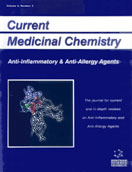Abstract
Nitric oxide (NO) is produced enzymatically in numerous tissues and considered as important mediator of many physiological and pathophysiological processes. NO is synthesized from L-arginine by three isoforms of the enzyme NO synthase (NOS). Among these three established isozymes of NOS, neuronal NOS (nNOS) and endothelial NOS (eNOS) are constitutive (cNOS) and low-output enzymes whose physiological functions are signal transduction. The third form of NOS, inducible NOS (iNOS), is constitutively expressed only in certain tissues and more typically synthesized in response to inflammatory or pro-inflammatory mediators. Although considerable evidences implicate the role of NO in the pathophysiology of inflammatory processes, there are contradictory reports in the literature concerning its role as an anti-inflammatory or pro-inflammatory agent. It is likely that NO from eNOS plays a role in the early stages of inflammation whereas NO from iNOS contributes to many aspects of chronic inflammation. Therefore, the use of selective iNOS inhibitors may be beneficial for the treatment of inflammatory processes. On the other hand, development of selective iNOS inhibitors will have to address potential problems related to inhibition of NO derived from cNOS in situations in which this mediator may be beneficial. In this review, contribution of NO to the pathophysiology of inflammatory conditions and clinical use of substrate-based NOS inhibitors, including arginine analogues and amidinecontaining inhibitors as potential anti-inflammatory agents in a variety of inflammatory diseases will be discussed.
Keywords: nitric oxide synthase inhibitors, inflammation, sepsis, asthma, arthritis, gastrointestinal system disorders, cardiovascular disorders
 3
3

